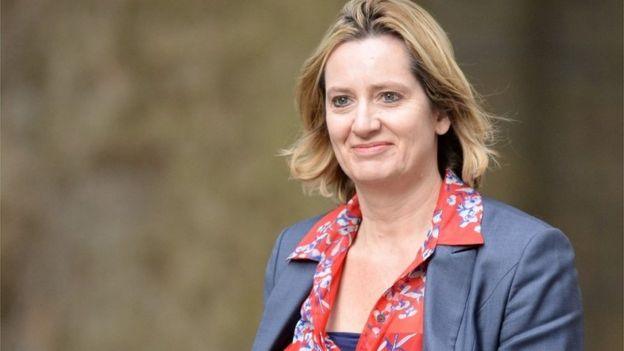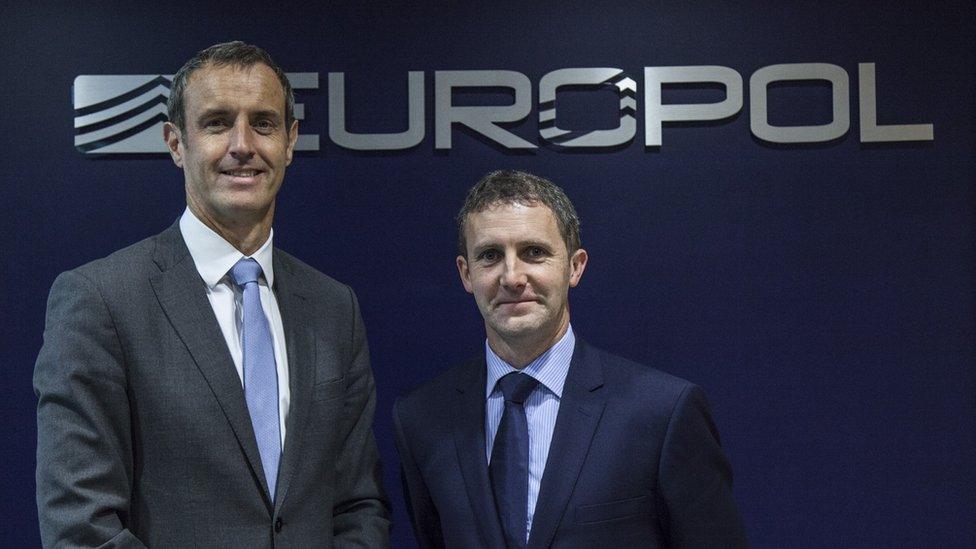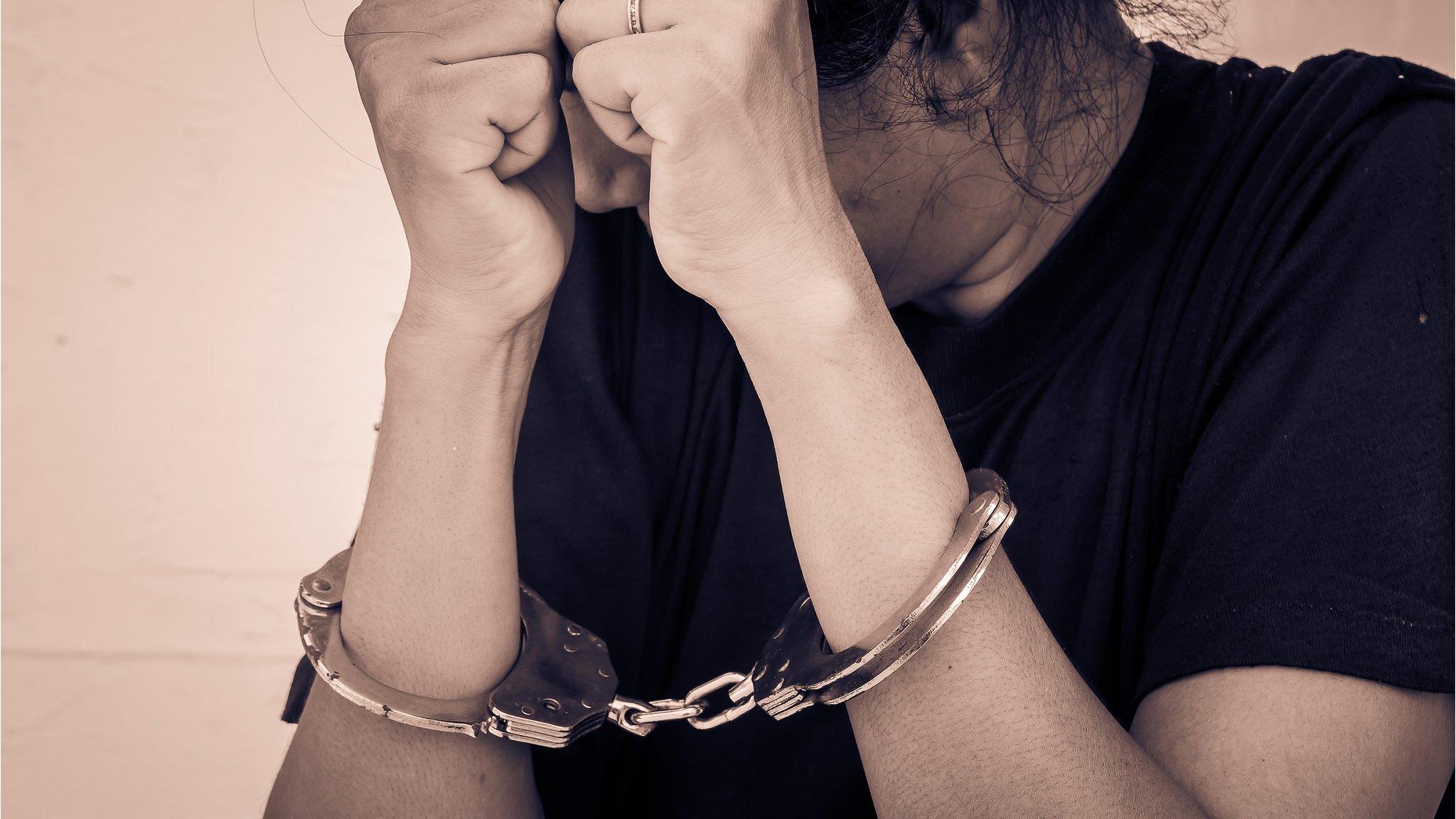Amber Rudd urged to sign new Europol protocol
- Published

UK Home Secretary Amber Rudd has been urged to sign protocols on membership of Europol
The Scottish government has written to UK Home Secretary Amber Rudd urging her to sign protocols on membership of the European crime-fighting agency Europol.
Failure to opt in by the end of 2016, would leave UK police unable to access Europol's resources after May 2017.
Scottish ministers said membership was vital in allowing Police Scotland to fight international crime.
The Home Office said it would make a decision on Europol in due course.
The issue does not arise from the Brexit vote - but the Scottish government fears it is being ignored as British negotiations to leave the EU gather pace.
'End uncertainty'
Justice Secretary Michael Matheson visited Europol's headquarters in The Hague on Friday, meeting its director-general Rob Wainwright and an officer from Police Scotland who is seconded to the agency.
He said failure of the UK to opt in to new Europol regulations would mean the UK was no longer a member of Europol before the UK government triggers Article 50.

Mr Matheson met Rob Wainwright at Europol headquarters
Mr Matheson said: "The ability to share information quickly and co-ordinate operations with other law enforcement agencies through Europol is key to detecting, disrupting and detaining criminals across borders.
"That is necessary to keep Scotland and the rest of the UK safer from the threats of organised crime, cybercrime and terrorism."
Mr Matheson has written to the Home Secretary pressing for the UK government to end the uncertainty for police and their law enforcement partners by making a decision to sign up to the revised Europol arrangements.
Assistant Chief Constable Steve Johnson, who has responsibility for counter-terrorism and organised crime at Police Scotland, told BBC Radio's Good Morning Scotland programme that Europol was "incredibly important" to the work that the force did.
'Keep our people safe'
He said: "It's part of our day-to-day policing now, particularly the work that we do at the Scottish crime campus alongside our partners.
"It enables us to continue to work with our partners across Europe to target those people who would want to commit crimes either in Scotland or people from Scotland who want to commit crimes in Europe.
"Candidly it enables us to mitigate the threats and harm posed by these people on the streets of Scotland."
The Scottish government said, notwithstanding the implications of Brexit and future discussions on these between the Scottish and UK governments, ministers at Holyrood were keen for Westminster to indicate to the European Commission that it intends to opt in to the new Europol Regulation.
A Home Office spokesperson said: "The UK remains a full member of Europol, and because of our justice and home affairs opt-in, we have the option to seek to opt-in to Europol's new legislative framework.
"This option remains open to us while we are a member of the EU. The government will take a decision on whether to opt-in to the new Europol Regulation in due course.
"The prime minister has stated that law enforcement co-operation will continue when the UK is outside the EU.
"We will do what is necessary to keep our people safe. We are exploring options for cooperation arrangements with Europol once the UK has left the EU but it is too early to speculate at this stage what future arrangements may look like."
Arrest warrants
Europol is responsible for operating the system of European Arrest Warrants, allowing offenders across the EU to be returned home to face justice.
In July, the Crown Office revealed that more than 500 cases, external have been heard in Scottish courts as a result of the EAW, while 367 people had been extradited from Scotland to face courts in Europe.
Among those brought to Scotland was Marek Harcar for the murder of Moira Jones. Her body was found in a Glasgow park, and Harcar, who was jailed for life for killing her, was traced to his home in Slovakia before being extradited to Scotland.
In April 2016 co-operation between Police Scotland and Romania's counter-mafia force DIICOT dismantled an organised crime gang trafficking women to Scotland's vice trade.
Europol said it had co-ordinated operations to raid four houses in Glasgow, with two men arrested and eight victims of trafficking handed over to the care of the authorities.
Europol has also helped to co-ordinate action against organised crime's systematic misuse of private individuals' computers to spread viruses or spam. Thousands of victims were identified across the UK.
A new Europol regulation adopted by Brussels before the June referendum gives the EU a larger role in supervising the agency's activities.
Ms Rudd said: "Europol has played an important role in keeping us safe and we will be having discussions about how to continue some form of involvement within the agencies of the EU that help to keep us safe."
- Published9 April 2016
